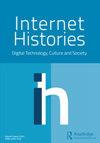VidAngel: Content filtering technologies, religion, and American copyright law
IF 1.2
Q3 COMMUNICATION
引用次数: 2
Abstract
Abstract This article traces a cultural history of the visual media filtering industry in the United States—from VHS tapes to internet filters to digital streaming platforms. Through an analysis of the company VidAngel, a video filtering start-up, and its recent copyright lawsuit brought by a group of major Hollywood film studios, we highlight the influential role that religion and copyright law, as interanimating forces, have played in the development of content identification and moderation technologies and practices. Emerging from this cultural history is a discourse that insists consumer rights to protect their families from morally objectionable content outweigh the copyrights of content creators. Used as a legal justification for content filtering, this family media rights discourse conflates personal moral decisions based on conservative religious values with neoliberal consumer empowerment in an effort to subvert hegemonic media systems by returning the power of media influence to private families in private settings. This article argues that religiously-motivated systems to identify and remove morally objectionable content have not only resulted in innovative business models targeting niche conservative religious audiences but that such businesses inevitably challenge and shape U.S. copyright law, significantly impacting several areas of contemporary media regulation well beyond the Mormon communities at the center of this narrative.内容过滤技术、宗教和美国版权法
本文追溯了美国视觉媒体过滤行业的文化历史——从VHS磁带到互联网过滤器再到数字流媒体平台。通过对视频过滤初创公司VidAngel及其最近由好莱坞主要电影制片厂提起的版权诉讼的分析,我们强调宗教和版权法作为相互作用的力量,在内容识别和审核技术和实践的发展中发挥了重要作用。从这段文化历史中出现的是一种话语,它坚持认为消费者保护家人免受道德上令人反感的内容侵害的权利比内容创作者的版权更重要。作为内容过滤的法律理由,这种家庭媒体权利话语将基于保守宗教价值观的个人道德决定与新自由主义消费者赋权混为一谈,试图通过将媒体影响力归还给私人环境中的私人家庭来颠覆霸权媒体体系。本文认为,以宗教为动机的识别和删除道德上令人反感的内容的系统不仅导致了针对利基保守宗教受众的创新商业模式,而且这些业务不可避免地挑战和塑造了美国版权法,显著影响了当代媒体监管的几个领域,远远超出了这一叙述的中心摩门教社区。
本文章由计算机程序翻译,如有差异,请以英文原文为准。
求助全文
约1分钟内获得全文
求助全文

 求助内容:
求助内容: 应助结果提醒方式:
应助结果提醒方式:


